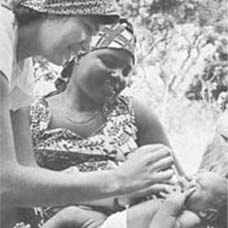
Kiribati RPCV Matthew Chico is Director of the Americas Region at the American Red Cross
Ask an Expert: Preventing Childhood Illness in Developing Countries
To help save the lives of 25,000 children each year under the age of five in a five year span, the American Red Cross in partnership with the Pan American Health Organization (PAHO), World Health Organization (WHO), UNICEF and other organizations, spearheaded a 10-country, five-year initiative in Latin America and the Caribbean. This initiative, the Integrated Management of Childhood Illness (IMCI), helps to save the lives of thousands of children who would otherwise die from easily prevented diseases.
Our expert is Matthew Chico, Director of the Americas Region at the American Red Cross. He has dedicated his career and expertise to improving healthcare services domestically and internationally, both through grassroots service delivery and at the national policy levels. He holds a graduate degree in Public Health from the George Washington University in Washington, DC and was a Health Policy and Management Fellow at the Harvard University School of Public Health in Boston, MA. His work history includes a tenure as a staff member in the United States Senate where he was involved in health policy legislation for rural, under-served populations. His sense of humanitarian service led Chico to work at Mother Teresa's Home for the Dying in Calcutta, India, after having served as a Peace Corps volunteer in the Republic of Kiribati and headquarters staff member. Among other duties, Chico has championed IMCI programming and other Public Health projects at the American Red Cross since 1997.
Q: What childhood diseases does the program work to prevent?
A: IMCI focuses on preventing and treating the five most common causes of infant and childhood deaths, namely diarrheal disease, acute respiratory infections, measles, malaria and malnutrition. These conditions are responsible for 70% of all deaths among children worldwide between the ages of 0-5.
Q: Why are these diseases so common in developing countries?
A: There are a variety of reasons why these diseases are prevalent in developing countries including the fact that more than half of the world’s population lacks access to safe drinking water and simple sanitation. Additionally, it is estimated that 800 million people worldwide (20% of all people in the developing world) do not have access to the food they need to live healthy, productive lives. Malnutrition contributes to the impact of all other illnesses by weakening children’s immune systems making them more likely to contract diseases and reducing their ability to recover from diseases once contracted. Ministries of Health in many resource-poor countries are able to spend between $5-10 per person per year. By comparison, the United States spends $4499 per capita each year in the provision of healthcare.
Q: How are the diseases prevented or treated?
A: Many of these diseases are prevented by making changes in community and household hygiene practices, the promotion of breastfeeding and improving access to and preparation of nutritious foods. When a child requires medical attention, “care-seeking” behavior is encouraged so that simple treatment may be provided at a health facility before the condition turns grave.
Q: What should individual families do to help prevent the diseases among their children?
A: The “16 Key Family Practices” (PDF file) are central to the success of IMCI and serve as basic guidelines prepared by the World Health Organization (WHO) and UNICEF. The 16 Key Family Practices are used in community assessments project design, community health training sessions and serve to inform family members about how to prevent these conditions and recognize danger signs which call for medical attention.
Q: When was the initiative launched?
A: IMCI was launched as a global health strategy in 1997. The American Red Cross adopted IMCI as part of its international health approach in the same year. American Red Cross subsequently signed “Healthy Children: Goal 2002”, a declaration in the Americas Region spearheaded by the Pan American Health Organization, the Americas Regional Office of the WHO. The aim of Goal 2002 was to save 100,000 lives – 25,000 per year – using the IMCI strategy.
Q: How close are you to your goal?
A: Country-level surveys are being conducted throughout the Americas Region to verify the reduction in childhood deaths. Estimates in early 2002 actually projected the Region to be well ahead of targets, perhaps saving as many as 120,000 lives. At minimum, however, 25,000 lives are saved each year in the Americas Region with the IMCI strategy.
Q: Why was the Latin America and Caribbean area chosen as the first IMCI region?
A: Red Cross National Societies of the Americas Region specialize in medical care. The American Red Cross sought to build upon this natural capacity and then, based on lessons-learned, introduce the IMCI strategy to Red Cross counterparts in other parts of the world.
Q: In what other countries is the program operated?
A: In addition to the ten country initiative in the Americas Region, the American Red Cross has IMCI projects in Armenia, Ghana, and Cambodia. American Red Cross has also implemented IMCI in war-torn areas such as Nagorno-Karabak.
Q: Will the program be launched throughout Africa and in other regions of the world?
A: Yes. As one example, in the case of Africa, the Measles Initiative is building capacity of Red Cross National Societies and Ministries of Health in Child Health and serves as a springboard into more holistic programming which prevents and treats all five leading killers of children under five.
You can support the IMCI program by contributing to the International Respose Fund. Donations to the International Response Fund can be mailed to your local Red Cross chapter or to the American Red Cross, P.O. Box 37243, Washington, DC 20013. Secure online credit card donations can be made by visiting www.redcross.org/donate/donate.html.








